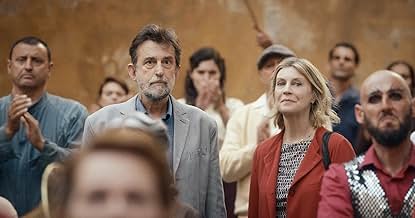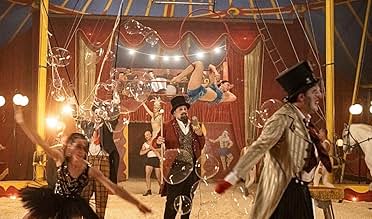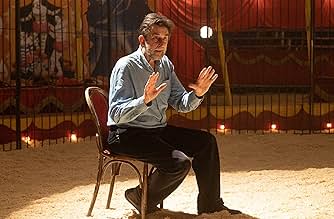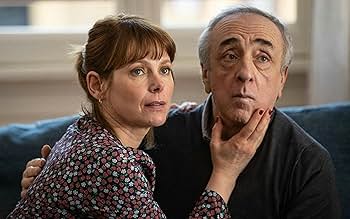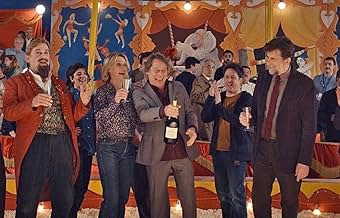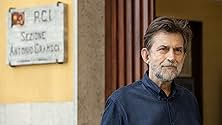ÉVALUATION IMDb
6,7/10
3,8 k
MA NOTE
Giovanni réalise, au milieu de mille incertitudes, un film sur la vie d'un intellectuel communiste en 1956, année fatidique de l'invasion soviétique de la Hongrie. Entre-temps, son mariage e... Tout lireGiovanni réalise, au milieu de mille incertitudes, un film sur la vie d'un intellectuel communiste en 1956, année fatidique de l'invasion soviétique de la Hongrie. Entre-temps, son mariage entre en crise.Giovanni réalise, au milieu de mille incertitudes, un film sur la vie d'un intellectuel communiste en 1956, année fatidique de l'invasion soviétique de la Hongrie. Entre-temps, son mariage entre en crise.
- Prix
- 2 victoires et 21 nominations au total
Avis en vedette
#Cannes2023# A film by a white old male director that far exceeded my expectations. It can be considered as a self-reflection and self-deprecating work from the usually narcissistic Moretti. He directed and acted in a movie that explores his journey from denial to ultimately admitting his creative decline, the irrelevance of his themes (at least to a diminishing audience), his inability to work without his wife "assistant" and the growing resentment from his crew towards his mansplaining . In the end, he also concludes with a false sense of hope, summarizing it as a lament for the leftist movements of the 1950s and acknowledging his inability to find a good ending. This self-analysis and sincere display of vulnerability moved me. There are countless directors in their old ages who have run out of creative juices, but not many can be this candid. Additionally, there are Fellini-esque elements throughout the film, with circus motifs and ensemble dancing, adding a touch of delightful nostalgia. @ Cannes Cineum Aurore.
Nanni Moretti creates a game of interpretations of himself by building a double vision of satire such as split screen, one with his narrator's voice, and in the other criticisms, ironies, melancholies, professional successes and private failures. A film within a film from the '50s to bear witness to the decadence of politics, while Giovanni mismanages his marriage, jeopardizing the film produced by his wife Paola. Everything is resolved with red flags in a parade with famous actors, Jasmine Trinca to with Renato Carpentieri during the march in a revival of the ideologies of the time. Maria Pia.
I found this film very enjoyable and funny. Of course it's not the first film about a director making a film, and I had only seen two of his films before so I can't tell to what extent this is "always the same Moretti stuff", but to me this film seemed rather unique and original. Nanni Moretti himself (called Giovanni in the film) is the main protagonist here, and he is mightily annoying, talking endlessly without listening properly to others including his wife, with a voice that reveals a clear sense for his own importance. This is however obviously ironic and self-deprecating (the Guardian reviewer, who slaughtered this film, apparently missed that, which is hard to believe but maybe something got lost in translation?) in an often very funny way. It helps to know such people in real life for appreciating his portrayal. Otherwise he is directing a film about Italian communists' reaction to the 1956 Hungarian uprising while the Italian communists host a Hungarian circus in Rome. He also deranges another film in which his wife participates lecturing the director on the "correct" use and non-use of violence in films. Meanwhile his very convincing down-to-earth wife prepares to separate from him (the audience can clearly see why she would want that) with a counsellor as on her own she apparently doesn't manage to take this step on her own. There is some surreal stuff with nods to Fellini and Godard in the film, and apart from Moretti's misbehaviour and the breaking down of his marriage there's some politics, feminism, and thought about cinema back then and now in the film. Moretti's general state resonates well with what goes on it the film he makes and how he directs it. Sometimes there is more than one layer of irony and it is not necessarily easy to get it all, but I for sure got enough out of it. There is a fine line between annoyance and fun in Moretti's ironic self-portrayal, but this came out on the right side for me, just about. Ultimately there is some development in his personality in a somewhat more pleasant direction; he can confess his own uncertainty and vulnerability, but will it last? I wasn't very keen on the end, but also this was ironically broken, which was well needed to make it acceptable for me. The film has its flaws, but I was well entertained, and I raise my hat to Moretti for his self-irony.
A Brighter Tomorrow, directed by Nanni Moretti, is a deeply introspective work that grapples with the challenges of aging, personal relationships, and the fading ideals of the past. The film weaves a meta-narrative as Moretti portrays a filmmaker struggling to complete a movie about the Italian Communist Party during the USSR invasion of Hungary in 1956, while also navigating the complexities of his personal life.
Moretti's performance is poignant, as he channels his characteristic wit and self-awareness to reflect on the inevitability of change. Margherita Buy and Silvio Orlando deliver nuanced portrayals, adding depth to the story's emotional layers. The interplay between Moretti's fictional and real-life personas creates a dialogue with the audience, blending humor and melancholy in a way that feels uniquely his own.
The film excels in its quieter moments, such as a scene where a reluctant young couple watches *La Dolce Vita*, a symbolic nod to the contrasts between generational attitudes. Moretti resists succumbing to nostalgia, instead embracing a tempered optimism that acknowledges the wounds of the past while looking toward the future. The sun may continue to rise, but it does so over landscapes marked by the scars of time.
A Brighter Tomorrow is not without its flaws-some viewers may find its self-referential approach too insular-but it remains a compelling exploration of resilience and the enduring power of art and connection.
Rating: 8/10 - A thoughtful and bittersweet meditation on change and perseverance.
Moretti's performance is poignant, as he channels his characteristic wit and self-awareness to reflect on the inevitability of change. Margherita Buy and Silvio Orlando deliver nuanced portrayals, adding depth to the story's emotional layers. The interplay between Moretti's fictional and real-life personas creates a dialogue with the audience, blending humor and melancholy in a way that feels uniquely his own.
The film excels in its quieter moments, such as a scene where a reluctant young couple watches *La Dolce Vita*, a symbolic nod to the contrasts between generational attitudes. Moretti resists succumbing to nostalgia, instead embracing a tempered optimism that acknowledges the wounds of the past while looking toward the future. The sun may continue to rise, but it does so over landscapes marked by the scars of time.
A Brighter Tomorrow is not without its flaws-some viewers may find its self-referential approach too insular-but it remains a compelling exploration of resilience and the enduring power of art and connection.
Rating: 8/10 - A thoughtful and bittersweet meditation on change and perseverance.
I didn't like this movie at all. Perhaps this was a movie for die hard Moretti fans that saw all his movies? For me the story was very weak, the pace was utterly slow and clearly they should prohibit certain directors to act in their own movies. There were some nice shots and sure I could smile a few times. I guess a metafilm can work, but I couldn't relate to neither one of the stories and both of the stories were quite superficial and unexciting. In short: I agree with the reviewer of the gardian who writes: "I'm sure the future will be brightened by another, better Moretti film - this one is best forgotten."
Le saviez-vous
- AnecdotesSelected to compete for the Palme d'or in the 2023 Cannes Film Festival. This is the ninth time that a film from director Nanni Moretti is selected at Cannes; every movie he made since "Caro diario" has been at Cannes, he even won the Palme d'or in 2001 with "The Son's Room."
- ConnexionsFeatures La dolce vita (1960)
Meilleurs choix
Connectez-vous pour évaluer et surveiller les recommandations personnalisées
- How long is A Brighter Tomorrow?Propulsé par Alexa
Détails
- Date de sortie
- Pays d’origine
- Langues
- Aussi connu sous le nom de
- A Brighter Tomorrow
- Lieux de tournage
- sociétés de production
- Consultez plus de crédits d'entreprise sur IMDbPro
Box-office
- Budget
- 12 284 110 € (estimation)
- Brut – à l'échelle mondiale
- 6 668 544 $ US
- Durée
- 1h 35m(95 min)
- Couleur
- Rapport de forme
- 1.85 : 1
Contribuer à cette page
Suggérer une modification ou ajouter du contenu manquant

![Regarder Trailer [OV]](https://m.media-amazon.com/images/M/MV5BZjUxOGY3NjUtN2RiNy00NDlkLWE4MGYtZjkxMTU2MmNmOTBmXkEyXkFqcGdeQXRyYW5zY29kZS13b3JrZmxvdw@@._V1_QL75_UX500_CR0)

